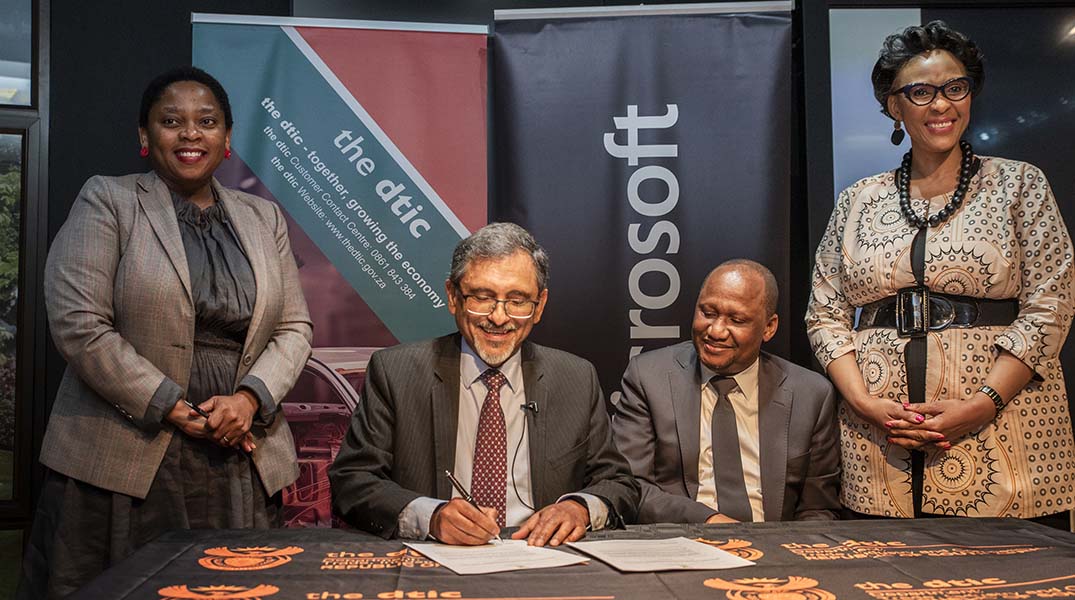Kathy Gibson reports – Microsoft is making about R1,3-billion available in an equity equivalence agreement with the Department of Trade, Industry and Competition (DTIC) for a fund supporting skills and capability development and enterprise development for youth and SMMEs.
The fund will, over the next 10 years, support SMMEs in both the technology and non-technology sectors; and it will provide for advanced skills development in artificial intelligence (AI) and other emerging technologies for young South Africans.
Microsoft SA will also establish an R&D Council to support initiatives tied to technology development in South Africa, and will partner with the Localisation Support Fund to provide dedicated technology resources to support the integration of advanced technologies into South Africa’s localisation and industrialisation programme.
On the skills development front, Kalane Rampai, MD of Microsoft South Africa, says Microsoft will collaborate with 18 TVET colleges to leverage its technology and ensure students are technologically proficient.
“This is a big step forward in building an inclusive and tech-proficient population, because we need to ensure that people have the requisite skills.”
A recent Microsoft survey shows that the use of generative AI (GenAI) at work has almost doubled in the last six months. “We are also seeing a significant number of professionals saying they have AI skills – and employers saying they won’t hire people without AI skills,” says Rampai.
“So people need to skill up on AI, and employers must invest in skills to remain attractive.”
Skills on their own won’t grow the economy, he adds. “SMMEs are the engine of job creation in South Africa. The number of SMMEs is increasing by 6% year on year, and we need to make sure they are sustainable.”
Rampai believes that technology is a key enabler for sustainable business, along with market opportunity.
“Our collaboration with the DTIC aims to unlock the potential of advanced technology to drive sustainable economic growth,” Rampai says.
“We need to ensure our citizens are part of the digital economy, and address the roadblocks. This agreement aims to enable and empower individuals, especially youth and SMMEs.”
Ebrahim Patel, minister of trade, industry and competition, says that today’s announcement will boost SMME development while strengthening growth of black industrialists as well.
He explains that the fund, established under the Broad-Based Black Economic Empowerment (B-BBEE) Equity Equivalence programme, will go a long way towards building a more inclusive economy to help black South Africans to play a bigger role in the economy.
“Technology changes are advancing at an unprecedented pace; they are reshaping industries and the employment landscape around the world.
“Through the agreement between Microsoft and the DTIC, a R1,3-billion fund will be set up to support black-owned busineses, and help young people gain necessary skills.”
Indeed, the agreement today is largest single equity equivalence contribution from a company, Patel says.
He adds that about half of the fund will be used to create and enterprise development fund to support technology firms and non-technology SMEs that are owned and controlled by black South Africans.
The technology fund, estimated to yield about R378-million, will focus on early startups to cover all the costs startups need to succeed. This fund will provide a bridge to bring on early-stage startups to the point where they can access capital from other sources.
The non-technology fund, or about R390-million, will help black-owned SMEs to flourish by using technology, assisting them to improve mainstream businesses.
Around R350-million will be earmarked for skills development, helping young South Africans to gain world class skills. This will include learnership programmes where young people with emerge with useful skills. The Microsoft fund will also assist learner with job placements.
The final part of the fund, about R160-million, will support critical projects that align industrial policy with the fourth industrial revolution (4IR).
In addition, Microsoft will set aside R50-million for a the Localisation Support Fund, which aims to help South African companies to produce more.
“The Microsoft investment focuses on enterprise development, skills development and localisation development,” says Patel. “It will help with our mandate of creating more jobs in South Africa, and strengthening the economy.”
Africa is a young continent, he adds, with the population expected to double from 1,4-billion today by 2050. “The rest of the world will contract, while Africa will expand. This means we will have an enormous workforce and consumer market.
“But just having opportunity is not sufficient: you have to unlock it. And this partnership can assist in doing that.”
Featured picture: Malebo Mabitje-Thompson, Acting Director-General of the Department of Trade, Industry and Competition; Minister Ebrahim Patel, Minister for the Department of Trade, Industry and Competition; Kalane Rampai, Managing Director, Microsoft South Africa; and Lillian Barnard, President, Microsoft Africa.

